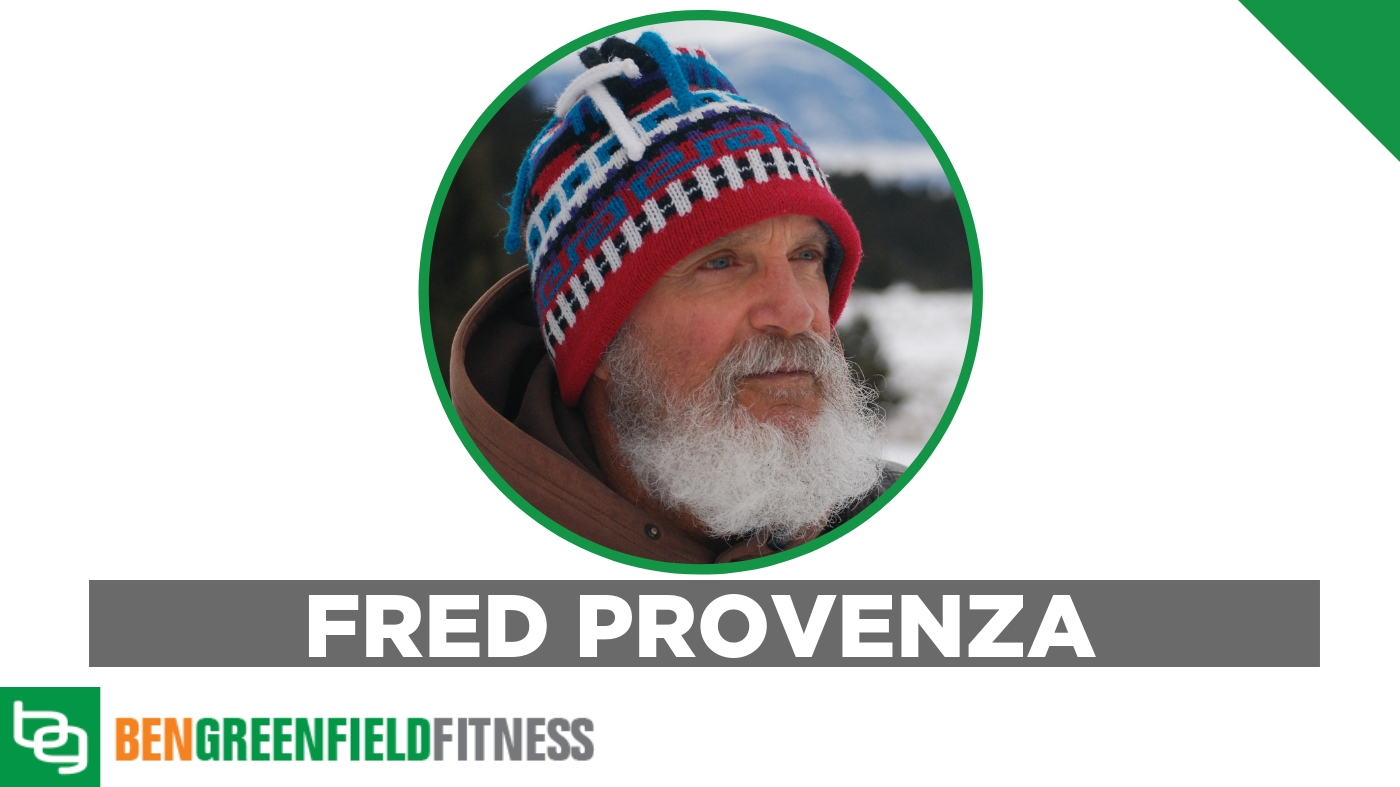March 7, 2019
Animal scientists have long considered domestic livestock to be too dumb to know how to eat right, but the lifetime research of animal behaviorist Fred Provenza and his colleagues have debunked this myth. Their work shows that when given a choice of natural foods, livestock have astoundingly refined palates, nibbling through the day on as many as fifty kinds of grasses, forbs, and shrubs to meet their nutritional needs with remarkable precision.
In his brand new book “Nourishment: What Animals Can Teach Us about Rediscovering Our Nutritional Wisdom,” Fred presents his thesis of the wisdom that links flavor-feedback relationships at a cellular level with biochemically rich foods to meet the body’s nutritional and medicinal needs.
Provenza explores the fascinating complexity of these relationships as he raises and answers thought-provoking questions about what we can learn from animals about nutritional wisdom.
What kinds of memories form the basis for how herbivores, and humans, recognize foods? Can a body develop nutritional and medicinal memories in utero and early in life? Do humans still possess the wisdom to select nourishing diets? Or, has that ability been hijacked by nutritional “authorities?” Consumers eager for a “quick fix” have empowered the multibillion-dollar-a-year supplement industry, but is taking supplements and enriching and fortifying foods helping us, or is it hurting us?
On a broader scale, Fred explores the relationships among facets of complex, poorly understood, ever-changing ecological, social, and economic systems in light of an unpredictable future. To what degree do we lose contact with life-sustaining energies when the foods we eat come from anywhere but where we live? To what degree do we lose the mythological relationship that links us physically and spiritually with Mother Earth who nurtures our lives?
Provenza’s paradigm-changing exploration of these questions has implications that could vastly improve our health through a simple change in the way we view our relationships with the plants and animals we eat. Our health could be improved by eating biochemically rich foods and by creating cultures that know how to combine foods into meals that nourish and satiate. Provenza contends that voices of “authority” disconnect most people from a personal search to discover the inner wisdom that can nourish body and spirit. That journey means embracing wonder and uncertainty and avoiding illusions of stability and control as we dine on a planet in a universe bent on consuming itself.
Fred Provenza is professor emeritus of Behavioral Ecology in the Department of Wildland Resources at Utah State University. At Utah State, Provenza directed an award-winning research group that pioneered understanding of how learning influences foraging behavior and how behavior links soils and plants with herbivores and humans.
Provenza is one of the founders of BEHAVE, an international network of scientists and land managers committed to integrating behavioral principles with local knowledge to enhance environmental, economic, and cultural values of rural and urban communities.
The many awards he received for research, teaching, and mentoring are the creativity that flowed from warm professional and personal relationships with over 75 graduate students, post-doctoral students, visiting scientists, and colleagues. Along with colleagues, he authored over 250 publications in scientific journals and books.
His first book was Foraging Behavior.
He co-authored a second book with Michel Meuret, The Art & Science of Shepherding: Tapping the Wisdom of French Herders.
In our podcast, we take a deep dive into all these questions and topics and many more, including:
-How Fred got interested in studying animals and their nutritional habits…7:45
- He was fascinated by all things having to do with nature from a very young age
- Led to studying wildlife biology at Colorado State U; worked on a ranch concurrently
- Ran the ranch after graduation for 2 years
- Led to Utah State studying for a grad degree
- Eating habits of goats contradicted conventional wisdom
- Book: Biochemical Individuality by Roger Williams
-Biochemical individuality: what it is, and why it's important…10:48
- There's no such thing as an “average animal” in regards to food selection
- Study on how animals “finished” eating…
- Total Mixed Ration: mixing ingredients together (5 total), versus offering them individually
- Animals with a choice on what to eat ate less than animals with no choice
- Gained weight, body composition was just as good
- Animals with no choice suffered over-ingestion
- 5 ingredients are not nearly as much as animals foraging in the wild
- No 2 animals selected the same combo of ingredients; nor the same food from day to day
-How Clara Davis' studies on children over 100 years ago is similar to Fred's work today…17:38
- Longest study ever done on human beings
- 6 years; performed on adopted children
- Choice of 34 different foods
- Allowed children to self-select their own diet
- “A body knows, will select what it needs.”
- Eerily similar findings; as though they were plagiarizing her words
- Children with Rickets Disease chose cod liver oil, then stopped eating it when they were cured
- Article: Clara M. Davis and the wisdom of letting children choose their own diets
-How nutritional wisdom is akin to three legs on a stool, where if one is broken, it won't work…23:38
- Leg #1: Flavor feedback relationships
- Feedback changes “liking” as a function of need
- “Vitamin fortification” affects our innate desire for nutrient-rich foods
- If someone is on a highly-processed diet, small amounts of nutrients are akin to the total mixed ration practice
- Energy gets packed away in the form of fat in our bodies
- Example of cows eating a 2 lb mixed mineral simply because they craved zinc in their system, which was in a small amount in the block of feed
- Leg #2: Wholesome alternatives
- Leg #3: Social and cultural considerations
- Role of mother to children is essential
- Babies' fetal taste system is fully functional during last trimester
- Learning about food world via amniotic fluid
- Mother's diet can influence flavor preferences of children
- Genes are being expressed as a function of the environment we experience
-How to find the right diet if you come from an ethnic and genetic melting pot…41:10
- Epigenetics: the study of changes in organisms caused by modification of gene expression rather than alteration of the genetic code itself. Very relevant to Fred's work
- Play the “long game”
- Establish and maintain a strong connection with your community, local environment, and diet
- Our genes become linked to the local environment over time and generations
- Bison, elephants, etc. with extended families become linked to their environment
- When you break the linkages, it's very difficult to reestablish
-Ancestral wisdom when it comes to pairing our foods…51:00
- Book: “Life in the Rocky Mountains” by Warren Angus Ferris
- When eating bison that were in good health, on a healthy diet, the taste was phenomenal; never got tired of eating it
- Grass-fed isn't grass-fed, isn't grass-fed
- Plant diversity in animals will influence flavor and biochemical composition of meat and fat, with implications for the health of human beings
- Feedlot diet: diverse mix of compounds vs. simple diet
- Quality of meat, fat, milk, etc. from an animal free range very different from one on a feedlot
-Synergy in diet, and when it's appropriate to supplement our diet with synthetic ingredients…55:40
- Research paper: Food, not nutrients, is the fundamental unit in nutrition
- The more you focus on individual compounds, the more deleterious health effects go away
- Need to eat wholesome foods, grown in good conditions
-What we can learn from animals when it comes to avoiding toxicity in our diets…1:00:40
- Pay attention to cues in your body
- Animals have innate ability to limit intake to levels that don't cause toxicity
- Animals love to eat a variety of foods
- 50-75 species within one meal
- All plants they eat are potentially toxic
- Variety contains secondary compounds; reduces toxicity
- Sheep will eat new buds but will taper off once they reach a phytochemical threshold induced by nausea
-About John Hoxsey and the formula he developed to heal cancer…1:11:45
- Had a prized stallion that developed cancer
- Couldn't bring himself to shoot it
- Put it to pasture to live out his days
- Began eating plants it hadn't eaten before
- Eventually cancer goes away
- Started a series of research that led to his formula
-And much more…
Click here for the full written transcript of this podcast episode.
Resources from this episode:
-Nourishment: What Animals Can Teach Us about Rediscovering Our Nutritional Wisdom
–Biochemical Individuality by Roger Williams
-Book: “Life in the Rocky Mountains” by Warren Angus Ferris
–PHY906 as a Chinese treatment
-Book: The Art & Science of Shepherding: Tapping the Wisdom of French Herder by Fred Provenza and Michel Meuret
-Book: Foraging Behavior by Fred Provenza
Episode Sponsors:
–Kion: My personal playground for new supplement formulations. Ben Greenfield Fitness listeners receive a 10% discount when you use discount code: BGF10. GetKion.com
–Organifi Green Juice: Now you can get all your healthy superfoods in one glass…with No Shopping, No Blending, No Juicing, and No Cleanup. Use discount code: BEN at checkout and get a 20% discount on your entire order! Organifi.com/Ben
–PSO-RITE: The PSO-RITE is your 24/7 massage therapist when your body needs it the most. Get a 10% discount when you order your PSO-RITE when you use my link: BenGreenfieldFitness.com/feelssoright and code: BEN10.














Ben love your pdcsst but your hypothesis of using herbs and spice rub on meat to increase antioxidant and counter act the negative effects of HCAs and PAHs seems misguided. Because,
1) majority don’t even work outside of the test tube in the body
2) very poor absorption
My recommendations would be to stick to essential nutrients with antioxidant properties such as vitamin C, vitamin E and selenium are absorbed and utilized by the human body.
Also raw meat os a-okay for me!
Reference
1 https://www.ncbi.nlm.nih.gov/pmc/articles/PMC3619154/
2 https://www.ncbi.nlm.nih.gov/pubmed/19636448
Cows know the difference in water quality as well. The first opportunity I had to observe this personally was on a pristine and lush organic farm in South India. I was speaking to a group of farmers about the merits of structured water and as show and tell, I filled two buckets with water from the farmers cistern and structured one bucket of water by running it through one of my handheld structuring units. We then set both buckets of water in front of the farmer’s milking cow and waited anxiously to see what the cow would do. The cow sniffed both buckets of water but showed no interest in drinking either. We gave up waiting and left the cow to continue on with my water presentation. Upon finishing my talk, our curiosity led us back to the cow which had literally licked the structured water bucket dry. The other bucket was still full to the brim with the untreated water.